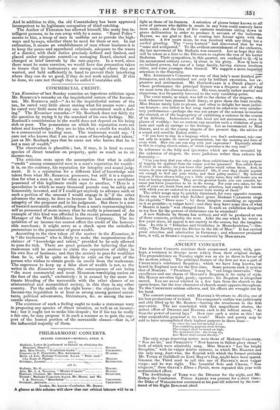COMMERCIAL CREDIT.
THE Examiner of last Sunday contains an ingenious criticism upon Mr. ROEBUCK'S remarks on the inquisitorial nature of the Income- tax. Mr. ROEBUCK said—" As to the inquisitorial nature of the tax,, he cared very little about stating what his means were ; and he cared very little more for any one who entertained such a feel- ing." The Examiner remarks—" Mr. Roebuck does not fairly try the question by trying it by the standard of his own feelings. Mr. Roebuck's consideration in the world does not depend on his being rich or poor. The possessions on which his reputation rests are talent and knowledge ; they are to him what a credit for wealth is to a commercial or trading man. The tradesman would say, 'I care not who knows that I am not a man of knowledge and talent,' just as Mr. Roebuck says that he cares not who knows that he is not a man of wealth."
The observation is plausible ; but, if true, it is fatal to every species of direct taxation on property, quite as much as to an income-tax.
The criticism rests upon the assumption that what is called "credit" among commercial men is a man's reputation for wealth : it is, on the contrary, his reputation for integrity and sound judg- ment. It is a reputation for a different kind of knowledge and talent from what Mr. ROEBUCK possesses, but still it is a reputa- tion for what a man is, not for what a man has. When a merchant possessed of this legitimate credit says to another, "Here is a speculation in which so many thousand pounds may be safely and honourably invested, and if I could get anybody to advance such or such a portion of the amount I would engage in it," if the other advances the money, he does so because he has confidence in the integrity of the proposer and in his judgment. But there is a sort of bastard mercantile credit, arising from a man's representing him- self as possessed of more money than he really is possessed of. An example of this kind was afforded in the recent prosecution of the Manager of the West Middlesex Insurance Company. The in- quisition of an income-tax cannot affect the credit of the honour- able merchant ; it might serve as a check upon the swindler's pretensions to the possession of great wealth. According to the view taken of the matter in the Examiner it is "the tradesman" who is likely to make the magnanimous dis- claimer of "knowledge and talent," provided he be only allowed to pass for rich. There are good grounds for believing that the tradesman will be anxious to claim the reputation of ability in his own line of business; and that the anxiety to pass for wealthier than he is, will be quite as likely to exist on the part of the person who wishes to obtain goods on credit from the tradesman. The eagerness to keep up a false show of wealth is not, as the writer in the Examiner supposes, the consequence of our being "the most commercial and most Mammon-worshiping nation on the face of the earth," exclusively : it is caused by the more in- timate blending of the mercantile with the other classes of an aristocratical and monarchical society, in this than in any other country. Put the saddle on the right horse : the objection to the Income-tax inquisition is at least as strong among genteel annui- tants, political adventurers, litterateurs, &c. as among the mer- cantile classes.
The existence of such a feeling ought to make a statesman wary in proposing any species of direct taxation, as well as an income- tax: but it ought not to make him despair ; for if his tax be really a fair one, he may propose it in such a manner as to gain the sup- port of the honest portion of the mercantile classes—that is, of the influential majority of them.


























 Previous page
Previous page